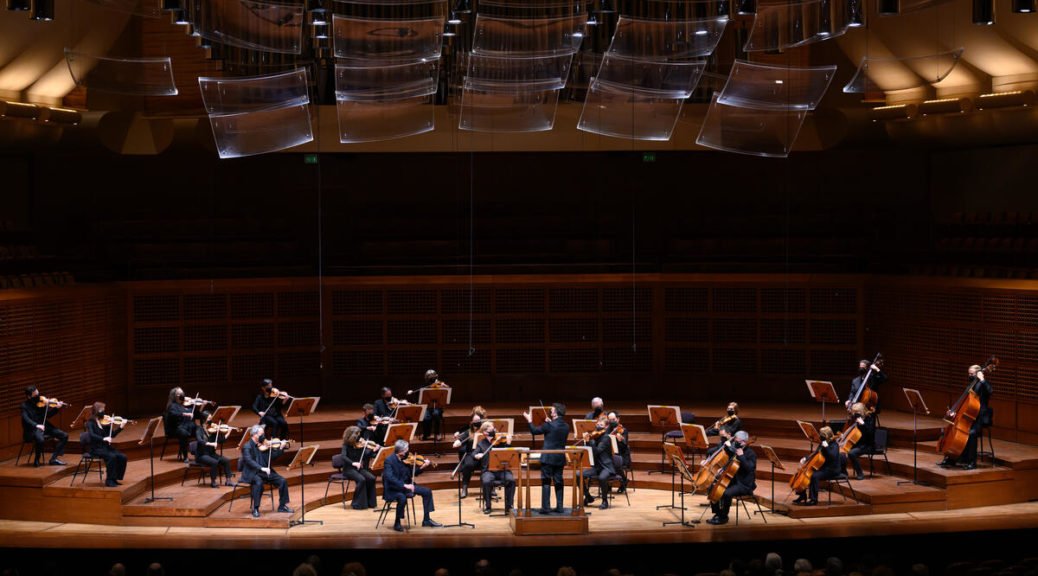
Strings Embark on a Never-Never Land
Come, leave stark reality behind and enter the ethereal, a fantasy world of caves, shadowy figures, dreams, apparitions, spooky forests, plus clouds floating over you making you lose your bearings.
Such is the world that the San Francisco Symphony guest conductor James Gaffigan calls “the journey….from magic to human magic and emotions.” His program for this nebulous world, all music unveiled since 1900, was exemplary, and he managed it without playing a note of Claude Debussy. It was followed by waves of enthusiastic applause, believe it or not, at the May 20 strings-only SFS concert.
“Strings only?” Not for long. Strolling down our aisle, Mark Hanson, the SFS executive director, was flagged down and he happily divulged that the day previous, permission was granted to resume using woodwinds and brass too—i.e., the whole orchestra—because the intruder Covid had grudgingly relented. All hands can play in SFS concerts at Davies Hall as of next month, and you can perhaps hear the deep breathing exercises resuming already, marking the resumption celebration.
In the most recent concert the newly emerging composer Freya Waley-Cohen, 31, showed a superb new piece of nebulous fantasy, “Talisman.” The English-American composer showed she was in no way superstitious, writing for 13 string players, each with a separate and distinct part. The 11-minute performance was enticing as you walked her slippery slope full of turns and surprises, and ear-tweaking chords that were never printed in our dog-eared music textbooks. Was this an unpredictable walk through a strange, disorienting forest? Or were the brilliant staggered and contagious pizzicatos more cave-like, suggesting water dripping from stalagmites?
I relished wandering through her musicscape, though never certain what awaited around the next bend. If that meant monsters, she quelled the fears with a brief lullaby from a handful of violins, and later a plaintive song on the solo cello (played by Peter Wyrick).
For Arnold Schoenberg’s half-hour-long “Transfigured Night,” quasi-operatic supertitles were artfully provided showing the Dehmel Symbolist poem that had inspired it. The poetic lines were timed just as though they matched the ebb and flow of twisted emotions running through the couple on their unsettling nocturnal stroll. The sense of yearning is paramount in the music, never resolving, never arriving at tidy goals. I especially relish the incredible beauty of Schoenberg’s “firefly music,” rendered by the two dozen SFS players under Gaffigan.
Gaffigan kept most of his gestures high in the air, like many opera conductors sunk in the pit. He bordered on the histrionic when casting aside his baton for Barber’s “Adagio for Strings,” which, so many decades later, has become by degrees one of the most performed American symphonic works. The Adagio is overflowing with a welcome measure of consolation to mark the challenges and losses during the pandemic.
Overall, it was a night to remember, off the beaten track, focusing on some inventive small-ensemble mood pieces infrequently heard in full-orchestra concerts. At the end of the 70-minute musicale, the conductor exchanged elbow bumps with the well-masked Concertmaster Alexander Barantschik, as if to signal we’re not quite back yet.
GAFFIGAN AT LARGE—The one-time SFS associate conductor (through 2009) has made a career in Europe, on the masthead of the Trondheim Symphony, Lucerne Symphony and Netherlands Radio Philharmonic, with opera gigs at Komische Oper Berlin and Bavarian State Opera Munich this year.
SAN FRANCISCO SYMPHONY STRINGS with Gaffigan conducting, works of Schoenberg, Barber, Waley-Cohen. May 20-21, at Davies Hall, S.F. For info, (415) 864-6000, or go online: www.sfsymphony.org.